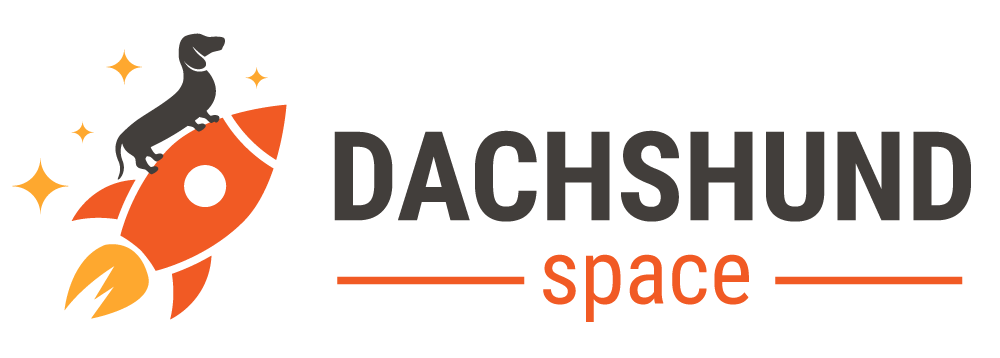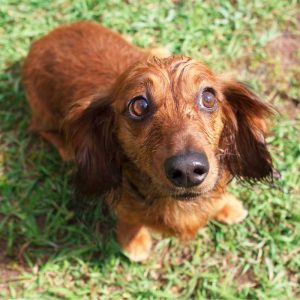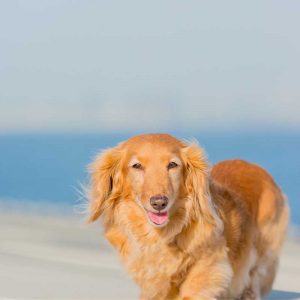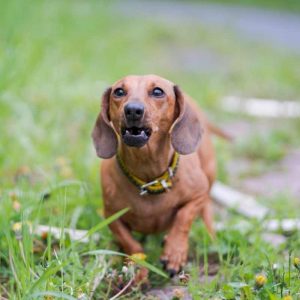A vast population of people experience allergies yearly. Whether it’s from food, grass, or pollen – allergies are brought on by many things. Dogs included, unfortunately. But as avid dog lovers, those stubborn allergies don’t necessarily have to stop us from buying or adopting a dog we love. There are ways around it, such as searching for a dog breed that is hypoallergenic! For instance, are Dachshunds hypoallergenic?

How Can A Dog Be Hypoallergenic?
We all know dogs shed, releasing dander into the air. This dander is what causes those allergies to flare up. If your dog sheds a lot, they are simply not hypoallergenic. A dog being hypoallergenic essentially means that they don’t shed or that they shed so little that it is less likely to cause an allergy outburst.
All dogs have dander within their fur, there’s no way around that. However, if dog fur affects you to a great extent, it may be better to find a dog breed that’s short-haired or less likely to shed consistently.
Are Dachshunds Hypoallergenic?
The short answer is no. Dachshunds are not a hypoallergenic breed because they actually shed quite a bit despite being a smaller breed. It’s just a lot less loose fur than a bigger dog breed would possess. Regardless, Dachshunds are one of the better choices of dogs for those who do struggle with allergies. Thus because the amount of fur and dander they do release isn’t usually enough to trigger said allergies.
But keep in mind, this doesn’t mean that their fur won’t cause a flare up. Everyone’s allergies are not affected in the same ways and some may even be able to avoid or manage theirs.
If you are someone who prefers to get a Dachshund rather than a hypoallergenic breed, it can be helpful to consider each type of Dachshund. Along with the pros and cons of owning one. Each one of them has different benefits based on the length of their hair and how much they’re prone to shed..
Smooth Hair
Dachshunds with smooth hair are the most common with this breed. They are sought-after more and, due to having short hair, many don’t think shedding will become an issue. These Dachshunds have shorter hair that is almost silky. The hairs are more separated, which increases the chances of them breaking loose and re-attaching onto fabricated surfaces.
Because the hairs are less likely to clump together, they are much harder to just pick up and dispose of. These Dachshunds are commonly shed comparatively and on a daily basis. The fur practically falls off as they are walking or playing, meaning any movement afterwards is likely to push it to the corners of your home. Therefore, there will be more excess dander lying around and triggering those allergies.
Long Hair
Dachshunds with longer hair are more likely to shed more than the shorter haired ones. However, cleaning is simple with these dogs. Due to their hair being longer and more coarse, it usually clumps together, making it easier to just pick up. Less hair floating around means less allergies flaring up!
Nevertheless, as the owner of this Dachshund, you would need to keep up on the status of their hair. If it’s too tangled or dry, it is more likely they are going to shed. Brushing these dogs a few times a week can help keep the shedding down to a minimum.
Wired-Like Hair
Of all the Dachshund breeds, the ones with wired hair are the best choice for someone with allergies. Although the name may sound as if their hair is prickly, that’s actually not the case. These Dachshunds have a soft layer of fur at the base and a much thicker, almost hard, coat on top of that. Because of this, they are less likely to shed consistently.
The shedding for these Dachshunds has been known to only occur periodically. However, similarly to having to brush a longer-haired Dachshund, hair care for these wired-haired pups could be as little as a light trim.
In conclusion to that, there really isn’t a dog breed that doesn’t shed at least a little bit. That’s just a part of owning a dog. But with some consistent brushing and hair care, it’s possible to reduce the fur floating around your home. Also, if you’re looking into getting a Dachshund but worried about the excess hair, getting a wired-haired Dachshund would be the best. Seasonal shedding provides less clean up time and more time to spend with your Dachshund!
Allergy Triggers in Dogs
So when it comes to understanding why some dogs cause allergies, we need to know the main sources of allergens. These are found in dog dander, saliva, and urine. Knowing these triggers will help us determine the impact of owning a specific breed, like the Dachshund. So are Dachshunds hypoallergenic? To answer that we need to break down each of these allergen sources.
Dander
Dander is tiny skin flakes and is a major allergen for many. When dogs shed their skin these microscopic particles become airborne and can be inhaled by humans. Dander is especially bad for people with sensitive immune systems as it can trigger an allergic reaction easily.
Dachshunds like all dogs produce dander. The amount can vary from dog to dog and their grooming routine. Regular grooming and bathing can reduce the amount of dander on the dog’s skin and coat and potentially reduce the severity of allergic reactions. But no breed including Dachshunds is completely dander free.
Saliva
Another major source of allergens is saliva. When dogs lick themselves their saliva transfers allergens to their fur. These allergens can then be spread around the home as the dog moves about, onto furniture, clothing and even the air.
Dachshunds are clingy and they often lick their owners. This behavior can spread saliva allergens. Potential owners with allergies need to consider this when owning a Dachshund as frequent cleaning and washing of hands after petting the dog can help manage the spread of allergens.
Urine
Urine contains proteins that can cause allergic reactions. When dogs pee these proteins can linger in the environment if not cleaned up quickly and thoroughly. Good hygiene and cleaning is key to minimize exposure to these allergens.
For Dachshund owners cleanliness is key in areas where the dog pees. Regular cleaning and disinfecting these areas can reduce the presence of urine proteins and lower the risk of allergic reactions. Training your Dachshund to pee in designated areas or using indoor potty solutions can also help manage allergen exposure.
Living with Allergies and Dogs
When asking the question are Dachshunds hypoallergenic? it’s not just about the breed. Here are some tips to help allergy sufferers live with their furry friends including Dachshunds.
Allergen Free Zones
Creating pet-free zones in your home can reduce your exposure to allergens. For example, making your bedroom an allergen-free zone is a sanctuary where you can escape from pet allergens and get a good night’s sleep. Keeping dogs out of these areas minimizes the spread of dander and saliva which are major allergens.
Air Purifiers
Air purifiers with HEPA filters are great at removing allergens from the air. They can catch pet dander, dust mites and other airborne particles so allergy sufferers can breathe easier. Placing air purifiers in areas where your Dachshund hangs out can help reduce the amount of allergens in your home.
Regular Vet Visits
Keeping your dog healthy through regular vet visits is key. A healthy dog is less likely to have skin issues that cause dander. Regular vet visits will keep your Dachshund’s skin and coat in top shape and potentially reduce the amount of allergens they produce. Your vet can also recommend specific grooming practices and products to further reduce allergens.
Alternative Hypoallergenic Breeds
If managing allergies with a Dachshund is tough, you might want to consider other breeds that are more hypoallergenic. Here are some to consider:
Breeds to Consider
- Poodle: Poodles have a curly, non-shedding coat that produces less allergens. They come in toy, miniature and standard sizes so you can find one that fits your living situation.
- Bichon Frise: Bichon Frises have soft, curly coats that shed minimally. They are small, friendly and great for families.
- Portuguese Water Dog: With a curly or wavy coat that sheds little, Portuguese Water Dogs are another good option for allergy sufferers. They are active, intelligent and make great companions.
Pros and Cons of Each
Each hypoallergenic breed has its own pros and cons:
- Poodle: Poodles are smart and trainable but require regular grooming to maintain their coat. They have high energy so need plenty of exercise and mental stimulation.
- Bichon Frise: These dogs are sweet and good with kids but need consistent grooming to prevent matting. They also suffer from separation anxiety if left alone for too long.
- Portuguese Water Dog: Active and friendly, Portuguese Water Dogs are great for families who love the outdoors. But their high energy and exercise needs might be too much for some owners.
Check out these breeds and spend time with them to see which one works for you and your allergies. No breed is 100% hypoallergenic but these are more allergy-friendly than others.
READ ALSO: What Is a Merle Dachshund? 12 Types of These Rare Dogs
Are Dachshunds Hypoallergenic? Wrapping Up
When asking the question “Are Dachshunds hypoallergenic?” you need to understand what dog allergies are and what Dachshunds are. No breed of dog is 100% hypoallergenic, some are more suitable for allergy sufferers. Dachshunds with their lovely personalities and unique looks do produce dander, saliva and urine. But there are ways to manage those allergens.





